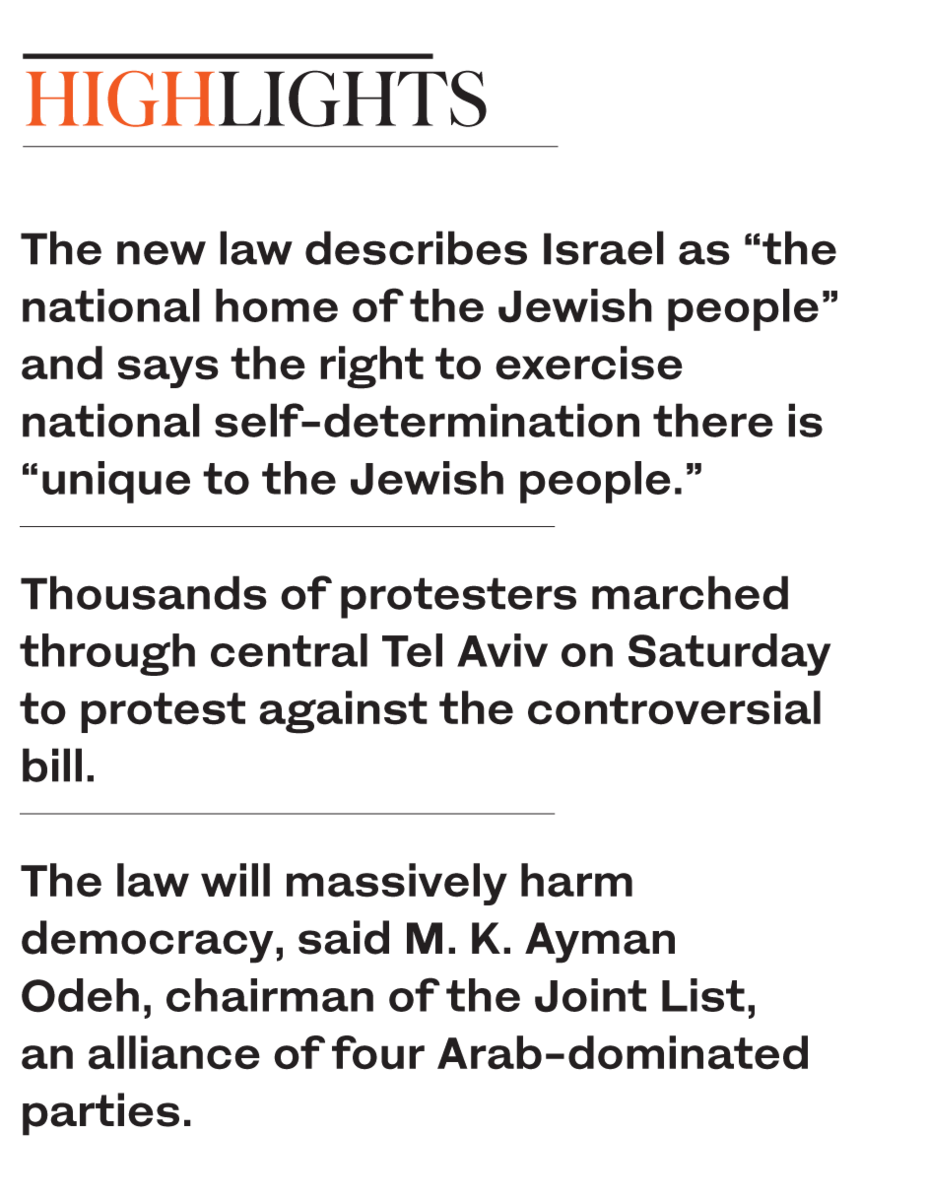AMMAN: Palestinians, Israelis and human rights activists have publicly denounced a controversial law passed by the Israeli Knesset which declares that only Jews have the right to self-determination in the country.
Palestine Liberation Organization (PLO) Secretary Saeb Erekat said that the legislation enshrines Israel as the national home of the Jewish people and “legalizes apartheid.”
“The ‘Jewish nation-state’ (law) officially legalizes apartheid and legally defines Israel as an apartheid system,” Erekat tweeted from the PLO Negotiation Affairs Department account.
“It is a dangerous and racist law. It denies Arab citizens the right to self-determination to instead be determined by the Jewish population.”
International law considers apartheid a crime against humanity.
Israel’s parliament, the Knesset, passed the law after hours of heated debate with 62 lawmakers voting in favor, 55 opposed and two abstaining.
The new law describes Israel as “the national home of the Jewish people” and says the right to exercise national self-determination there is “unique to the Jewish people.”
The new law recognizes Jerusalem as the capital of Israel and calls for Jerusalem to remain an undivided city.
Sama Aweidah, director of the Women’s Studies Center in Jerusalem, told Arab News that the racist nature of the law should be exposed.
“What is expected of all the Palestinian missions abroad is to explain to the peoples of the world and especially human rights organizations the true racist nature of Israel.”
Discrimination
PLO executive committee member Dr. Hanan Ashrawi said that the law gives “license to apartheid, discrimination, ethnic cleansing and sectarianism at the expense of the Palestinian people.”
She also took a swipe at the Trump administration, saying: “Undoubtedly, the US administration’s blind bias in favor of Israel and its total disdain for international law have emboldened Israel to persist with such unlawful and immoral policies.”
Botrus Mansour, director-general of the Baptist School in Nazareth, said that the law reflects the absence of Israeli confidence.
“If Israel needs to declare that it is ‘the national homeland of the Jewish people’ after 70 years of independence and tens of thousands of causalities, then that reflects a lack of confidence and belief in their own ways.”
Mansour, a member of the Israeli Bar Association, said that the new bill would have little effect on the ground. “This is a declarative law created by a narrow nationalistic agenda that doesn’t change anything on the ground except for the exclusive rhetoric, hate speech and feelings of marginalization and added alienations of the Arabs in the homeland that they and their ancestors have been living in for centuries.”
Sharona Weiss, director of international relations and advocacy at Yesh Din: Volunteers for Human Rights, said that many Israeli and Palestinian human rights organizations are deeply concerned about the bill and are examining its legality.
“I would not be surprised if eventually a few organizations petition the High Court, once they have examined the details of the bill. However, it is always a sensitive matter petitioning against a law passed in a democratically elected parliament.”
Weiss said that the law enshrined “the discriminatory and unjust practices that Israel has been acting on for years, which actually could be a good thing, in that the world can no longer ignore what’s happening and can no longer call Israel ‘democratic.’ Israel’s true colors can be seen, which could be a catalyst for real change.”
Thousands of protesters marched through central Tel Aviv on Saturday night to protest against the controversial bill, calling it racist and discriminatory.
Under the banner “This is home for all of us,” public figures, parliamentarians and social activists addressed the demonstration, with participants marching from Rabin Square to the Dizengoff Center.
Addressing the crowd, M.K. Ayman Odeh, chairman of the Joint List, an alliance of four Arab-dominated parties, said that what is most frightening to the right-wing Israeli government is that Jews and Arabs can live together.
“The nation-state bill won’t make us disappear, but it will massively harm democracy,” he said.
Gershon Baskin, an Israeli political scientist, described the passing of the law as “the darkest day” of Israel’s already challenged democracy.
“The Palestinian citizens of Israel, according to the Netanyahu regime, represent a barely tolerated minority,” he said.














